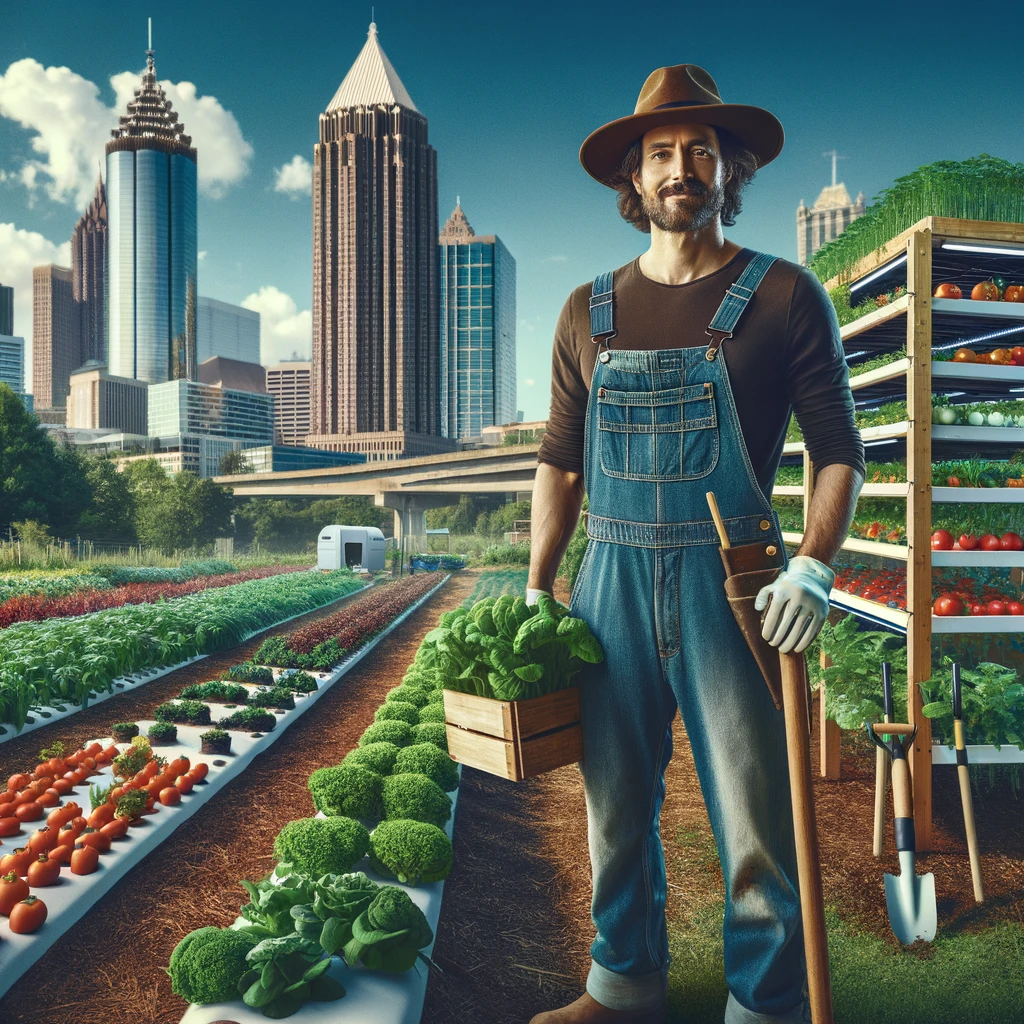Introduction
Let’s take a deep dive to ATL urban farm dream journey.
ATL’s Urban Farm Dream is a captivating tale of one farmer’s inspiring journey towards sustainable agriculture in the city.
Meet Sarah, an ambitious and determined farmer who embarked on a mission to transform unused urban spaces into thriving farms.
Sarah’s journey began with extensive research and planning, studying various farming techniques and sustainable practices.
Passionate about addressing food insecurity and promoting healthy eating, Sarah believed that urban farming could make a real difference in her community.
She faced numerous challenges along the way, including securing land and funding for her project. However, Sarah’s dedication never wavered.
With sheer determination, Sarah convinced local authorities to allow the use of vacant lots for her urban farm.
She gathered a team of enthusiastic volunteers, and together, they transformed derelict spaces into lush gardens filled with fresh produce.
The urban farm quickly gained popularity, attracting locals who were eager to learn and get involved in the sustainable farming movement.
Sarah’s hard work paid off as the once barren landscapes turned into vibrant hubs of community engagement and education.
Not only did her urban farm provide nutritious food to the area, but it also served as a platform for workshops on gardening and healthy cooking.
Sarah’s inspiring journey serves as a testament to the power of individuals in effecting positive change in their communities.
As more urban dwellers become aware of the benefits of sustainable agriculture, ATL’s Urban Farm Dream continues to flourish, creating a greener and healthier city for all.
Read: Small Farm, Big Yield: Secrets Unveiled
Background of Urban Farming in Atlanta
Overview of the urban farming movement in Atlanta
Urban farming has been gaining popularity in Atlanta in recent years. The movement aims to transform vacant lots and unused spaces into productive urban farms.
Transform Your Agribusiness
Unlock your farm's potential with expert advice tailored to your needs. Get actionable steps that drive real results.
Get StartedOne of the main reasons for the growth of urban farming in Atlanta is the desire to increase access to fresh and healthy food for city residents.
Many low-income neighborhoods in the city are considered food deserts, lacking access to affordable, nutritious food options.
Urban farms help address this issue by bringing fresh produce closer to the communities that need it the most.
Importance and benefits of urban farming in the city
Urban farming in Atlanta is a catalyst for economic growth, generating employment opportunities and bolstering the local agricultural sector.
Since its inception in the early 2000s, the movement has rapidly gained momentum, reclaiming urban spaces and transforming them into productive farms.
These urban farms, once vacant lots or rooftops, now serve as vibrant hubs of activity, fostering community engagement and providing invaluable educational resources.
Through workshops and programs, residents are empowered to cultivate their food, fostering self-sufficiency and promoting a deeper connection to the food system.
Atlanta’s diverse population has embraced urban farming, recognizing its role in promoting food justice and environmental sustainability.
Notably, the influence of individuals like Will Allen, founder of Growing Power, has been instrumental in inspiring and guiding aspiring urban farmers in the city.
The impact of urban farming extends beyond food production, addressing critical issues such as food access and environmental stewardship.
By increasing the availability of fresh, locally grown produce, urban farming helps mitigate food deserts and promotes healthier dietary habits among residents.
However, the movement faces challenges, including limited access to land, climatic variations, and resource constraints.
Despite these obstacles, Atlanta’s urban farming community remains resilient and continues to grow, driven by grassroots initiatives and community support.
As awareness of the benefits of urban farming spreads, so too does its influence on shaping a more sustainable and equitable food system in Atlanta.
It represents not merely a passing trend but a fundamental shift towards a future where cities prioritize local food production, environmental stewardship, and community well-being.
Through collective action and ongoing innovation, urban farming in Atlanta is poised to play a pivotal role in creating a more resilient and prosperous city for all its residents.
Meet the Farmer
In this chapter, we dive deep into the life and motivations of one exceptional farmer, whose passion for urban farming has transformed his career and community.
Get ready to meet an extraordinary individual who is making a big impact through his love for agriculture.
Brief background and introduction of the farmer
Introducing John, a farmer with a deep-rooted passion for sustainable agriculture and a drive to make a difference.
Born and raised in the heart of Atlanta, John developed a strong connection with nature from an early age.
Surrounded by concrete and buildings, he longed for greenery and a connection to the land.
With a background in environmental studies, John initially pursued a career as a biologist.
However, he soon realized that his true calling was in cultivating the earth and nurturing life.
Driven by a desire for change and a vision of transforming urban landscapes, John made the bold decision to become an urban farmer.
His mission? To bring the joys of fresh, locally grown produce to the heart of the city.
Reasons behind choosing urban farming as a career
John’s decision to pursue urban farming stemmed from his firsthand observation of food insecurity in disadvantaged communities.
Witnessing the limited access to nutritious food options, he was driven to make a difference by establishing urban farms in these areas.
His goal was to empower these communities by providing them with a sustainable source of fresh and affordable produce, regardless of their socio-economic status.
He firmly believed that everyone deserved access to healthy and nourishing food, and urban farming was his way of addressing this injustice.
Additionally, John was motivated by his desire to mitigate the environmental impact of traditional farming practices.
He recognized the detrimental effects of industrial agriculture on the environment, including pollution, habitat destruction, and greenhouse gas emissions.
With urban farming, John saw an opportunity to reduce the carbon footprint associated with food production.
By revitalizing abandoned lots and minimizing the need for transportation and harmful chemicals, he believed urban farming could offer a more environmentally friendly alternative.
Through his dedication and hard work, John transformed his vision into a reality, turning once barren city lots into thriving urban farms.
He collaborated with local schools and community organizations to educate others about the benefits of sustainable farming practices, inspiring a new generation to embrace agriculture and environmental stewardship.
As John’s story gained traction, more individuals became interested in urban farming, and volunteers eagerly joined his cause.
Together, they formed a supportive community united by their shared passion for sustainable agriculture and a commitment to creating a greener future for Atlanta.
In a nutshell, John’s journey into urban farming has not only impacted his life but also the lives of countless others.
Through his passion for addressing food insecurity and environmental sustainability, he has cultivated a thriving movement that continues to grow and inspire positive change in Atlanta’s communities.
Read: Urban Farming: Thriving in Tiny Spaces
Challenges Faced by the Farmer
As our farmer embarks on their urban farming journey in Atlanta, they encounter various obstacles along the way.
These challenges test their resilience and determination, but they push through, finding inventive solutions and learning valuable lessons.
Let’s explore some of the specific hurdles faced by the farmer and how they overcame them:
Limited Space
The farmer’s first challenge was the limited space available for their urban farm.
In a city like Atlanta, where land is scarce, finding adequate space for farming can be daunting.
Undeterred, the farmer turned to vertical farming techniques, utilizing walls and rooftops to maximize their growing area.
Financial Constraints
Starting a farm requires a significant investment in equipment, seeds, and infrastructure.
The farmer faced financial constraints that threatened their dream.
However, they sought grants and crowdfunding opportunities to secure the necessary funds.
With the support of their community, they managed to overcome this challenge.
Lack of Expertise
Being a novice farmer, the lack of experience posed a considerable challenge.
To address this, the farmer attended workshops and seminars, seeking knowledge from experienced farmers and agricultural experts.
They learned about crop rotation, pest control, and sustainable farming practices, gradually building their expertise.
Unpredictable Weather
Mother Nature can be unpredictable, and adverse weather conditions can pose a significant risk to crops.
The farmer faced this challenge head-on by investing in climate control technology, such as greenhouses and hydroponic systems.
This allowed them to create a controlled environment, ensuring optimal growing conditions regardless of external factors.
Showcase Your Farming Business
Publish your professional farming services profile on our blog for a one-time fee of $200 and reach a dedicated audience of farmers and agribusiness owners.
Publish Your ProfileLimited Water Supply
Water scarcity is a concern for urban farmers, and our farmer faced this challenge too.
However, they implemented water conservation techniques like drip irrigation and rainwater harvesting systems.
By utilizing every drop efficiently, they ensured their farm thrived while minimizing the strain on local water resources.
Accessibility to Markets
Connecting with customers and establishing a market presence can be challenging for urban farmers.
The farmer tackled this obstacle by actively participating in local farmers’ markets, forging partnerships with nearby restaurants, and utilizing social media platforms to showcase their produce.
Their tenacity paid off, as the demand for their fresh and locally grown produce grew steadily.
Dealing with Pests and Diseases
As any farmer knows, pests and diseases are constant adversaries.
The farmer faced this challenge by adopting organic pest control methods, companion planting, and incorporating beneficial insects into their farming practices.
They focused on maintaining a healthy ecosystem within their farm, which helped prevent and manage pest infestations effectively.
Community Engagement
Building a sense of community and educating the public about urban farming proved to be crucial but challenging.
The farmer organized farm tours, workshops, and volunteering opportunities, actively engaging with schools and local organizations.
Through these efforts, they created awareness and inspired others to embrace sustainable agriculture.
Scaling Up
As the farmer’s urban farm gained popularity, they faced the challenge of scaling up operations to meet the growing demand.
They expanded their farming area, recruited additional staff, and invested in efficient machinery.
By carefully planning and executing their expansion, they were able to increase their output while maintaining the same level of quality.
Maintaining Sustainability
While urban farming is inherently sustainable, the farmer continually strived to enhance their practices.
They implemented composting systems, practiced crop rotation, and used organic fertilizers.
By prioritizing sustainability in every aspect of their farm, they not only minimized their environmental impact but also served as a role model for aspiring urban farmers.
Each challenge our farmer faced gave rise to an opportunity for growth and innovation.
Through determination, perseverance, and a commitment to sustainable farming, they overcame numerous obstacles.
The journey wasn’t easy, but it allowed the farmer to create a thriving urban farm in Atlanta, serving as a beacon of inspiration and contributing to the city’s food security and sustainability goals.
Read: Digital Age Farming: Millennials on the Field
Farm Setup and Practices
Description of the farmer’s urban farm setup
- The urban farm is situated on a large rooftop space in the heart of Atlanta.
- The farmer has transformed this previously barren space into a thriving oasis.
- Raised beds made from recycled materials are used to grow a variety of crops.
- The farm is meticulously organized, with each bed labeled and designated for specific plants.
- Vertical gardening structures are installed to maximize space utilization and productivity.
- A small greenhouse is also present, providing a controlled environment for seed propagation.
- Composting bins are strategically placed to ensure the efficient recycling of organic waste.
- The farm features a rainwater harvesting system, collecting water for irrigation needs.
- Bees and chickens are also part of the setup, contributing to the farm’s biodiversity and sustainability.
- The farmer’s urban farm setup showcases the innovative use of limited urban space for agricultural purposes.
Sustainable and organic farming practices implemented
- The farmer follows sustainable farming practices to minimize environmental impact.
- Crop rotation is practiced to prevent soil depletion and pest infestation.
- Cover cropping is employed to improve soil health and control weeds naturally.
- Natural pest control methods are utilized, such as companion planting and beneficial insect conservation.
- Chemical pesticides and synthetic fertilizers are strictly avoided.
- Instead, the farmer focuses on using organic fertilizers and compost to nourish the soil.
- The farm relies on natural pollinators like bees to ensure the success of crop pollination.
- Water conservation is a priority, with drip irrigation systems and rainwater harvesting in place.
- By implementing sustainable and organic farming practices, the farmer aims to create a healthy ecosystem.
- The farm serves as an example of how urban agriculture can have a positive impact on the environment and community.
Benefits of sustainable and organic farming practices
- Enhances soil fertility and structure.
- Reduces water consumption and runoff.
- Promotes biodiversity and natural pest control.
- Minimizes exposure to harmful chemicals for both farmers and consumers.
- Enhances the nutritional value and taste of crops.
- Contributes to the overall health and resilience of the local ecosystem.
Challenges and solutions in urban farming
- Limited space: Vertical gardening and raised beds allow for efficient space utilization.
- Lack of natural resources: Rainwater harvesting and composting address water and nutrient needs.
- Pests and diseases: Companion planting and beneficial insects help control pests naturally.
- Community support: Engaging the community through education and involvement can overcome challenges.
- Zoning regulations: Working with local authorities and advocating for favorable policies can mitigate issues.
Essentially, the farmer’s urban farm setup exhibits a well-organized and sustainable approach to farming in the heart of Atlanta.
By implementing organic practices, utilizing limited space, and overcoming challenges, this farm serves as an inspiration for the community, showcasing the potential of urban agriculture.

Community Engagement and Impact
In the journey of creating an urban farm dream in Atlanta, community engagement plays a vital role.
The farmer actively involves himself with the local community, resulting in a significant positive impact on the overall community.
The farmer’s involvement with the local community
- The farmer actively participates in community events, such as farmers markets, fairs, and cultural festivals.
- He collaborates with schools and educational institutions to teach students about sustainable farming and healthy eating.
- The farmer conducts workshops and training sessions for aspiring farmers, sharing his knowledge and experience.
- He organizes volunteer programs, giving community members an opportunity to contribute and learn about farming practices.
- Regular community meetings are held where the farmer listens to concerns and suggestions, fostering a sense of ownership and involvement.
- The farmer engages in partnerships with local businesses, strengthening ties between the farm and the community.
The positive impact the farm has on the community
- The farm provides fresh and organic produce to the community, promoting healthier eating habits and reducing food insecurity.
- Local residents have access to affordable, locally grown food, supporting their overall well-being.
- The farm creates job opportunities, especially for individuals with a passion for sustainable agriculture, boosting economic growth.
- By utilizing vacant lots and transforming them into productive spaces, the farm beautifies the neighborhood and reduces urban blight.
- Through educational initiatives, community members become more aware of environmental sustainability and the importance of supporting local farmers.
- The farm serves as a gathering place, fostering a sense of community and providing a platform for social interaction.
Basically, community engagement has been instrumental in shaping the success and positive impact of the urban farm dream in Atlanta.
The farmer’s active involvement with the local community, coupled with the farm’s numerous benefits, has created a symbiotic relationship between the farm and its surroundings.
As the urban farm continues to thrive, it continues to inspire and empower the community, establishing a model for sustainable agriculture and community development.
Success Stories
Success stories or significant achievements of the farmer
- The urban farmer’s dream became a reality when he successfully established an urban farm in Atlanta.
- He transformed an abandoned lot into a flourishing oasis that provided fresh produce to the community.
- With determination and hard work, he overcame the challenges of limited space and lack of resources.
- The farmer’s innovative techniques, such as vertical gardening and hydroponics, maximized the yield of his crops.
- Through his commitment to organic farming, he gained recognition for producing high-quality, pesticide-free vegetables.
- The urban farm became a symbol of resilience and sustainability in the midst of a concrete jungle.
- The farmer received accolades from local authorities for his contribution to the urban farming movement.
- His success story inspired other aspiring farmers to follow their dreams and utilize urban spaces effectively.
Testimonials
- One satisfied customer shared, “The vegetables from the urban farm are so fresh and delicious!”
- Another customer expressed how happy they were to support a local farmer who was making a positive impact on the community.
- A community member stated, “The urban farm has brought our neighborhood together, fostering a sense of community.”
- The availability of fresh produce in the neighborhood has improved the overall health and well-being of residents.
- A local restaurant owner praised the farmer’s dedication, saying, “The urban farm has become our primary source of fresh ingredients.”
- Community members appreciate being able to buy locally grown produce at affordable prices.
- The farmer’s commitment to environmentally friendly farming practices has earned the respect and support of the community.
- The urban farm has become a gathering place for educational programs, teaching children about sustainable farming and healthy eating.
As the urban farmer’s journey continues, his success stories and testimonials serve as motivation for others to follow their dreams and make a difference in their communities.
The achievements he has accomplished prove that with dedication, perseverance, and innovative thinking, urban farming can transform abandoned lots into thriving green spaces.
The testimonials from satisfied customers and community members highlight the positive impact the urban farm has had on the neighborhood.
The availability of fresh produce has improved the overall health and well-being of residents, while also promoting a sense of community.
The farmer’s passion for organic farming and sustainable practices has not only resulted in high-quality vegetables but also earned recognition from local authorities.
Through his success, the urban farmer has become an inspiration for others, encouraging them to pursue their dreams and transform unused urban spaces into productive gardens.
Lessons Learned and Future Plans
Lessons learned by the farmer throughout their journey:
- Hard work and dedication are key factors in the success of an urban farm.
- Building a strong community network is crucial for support and sustainability.
- Adaptability and a willingness to learn from mistakes are essential traits for a farmer.
- Managing resources efficiently and effectively is vital for long-term growth.
- Continuous education and staying updated with new farming techniques are necessary for progress.
- Having a diverse range of crops helps mitigate risks and ensures a steady income.
- Understanding local regulations and policies is important to prevent legal hurdles.
- Creating a positive brand image and marketing the farm’s produce are integral for profitability.
- Regular soil testing and implementing sustainable farming practices promote environmental conservation.
- Building relationships with local restaurants and farmers’ markets enhances sales opportunities.
Future plans for the urban farm:
- Expand the farm’s operation by acquiring additional land to accommodate increased demand.
- Invest in advanced farming technology to improve efficiency and productivity.
- Establish a training program for aspiring urban farmers to share knowledge and promote sustainable practices.
- Collaborate with local schools to develop educational programs on urban farming for students.
- Organize community events and workshops to raise awareness about the benefits of urban farming.
- Introduce a CSA (Community Supported Agriculture) program to provide fresh produce directly to local residents.
- Diversify the farm’s product offerings by exploring niche markets such as organic herbs or exotic vegetables.
- Implement a composting system to further reduce waste and improve soil fertility.
- Partner with nearby restaurants to create farm-to-table experiences and increase brand visibility.
- Continue attending agriculture conferences and workshops to stay updated with the latest industry trends.
The journey of this urban farmer has been filled with valuable lessons that have shaped their farming practices. Through hard work and dedication, they have witnessed firsthand the rewards and challenges of urban farming.
One of the most significant lessons learned is the importance of building a strong community network.
By fostering relationships with local residents, fellow farmers, and community organizations, the farmer has gained much-needed support and resources.
This network has not only provided assistance in times of need but has also created a sense of camaraderie within the farming community.
Adaptability has also been a key lesson learned throughout the farmer’s journey.
As they faced various obstacles, such as extreme weather conditions or pest infestations, they quickly adapted their farming techniques to minimize losses.
Embracing change and being open to new ideas has allowed the farmer to continuously improve their practices and ensure the farm’s sustainability.
Proper resource management has been another crucial lesson learned. From efficiently allocating water and fertilizer to optimizing labor, the farmer has realized the importance of utilizing resources effectively to maximize output. This not only minimizes costs but also reduces the farm’s environmental impact.
Continuous education has played a significant role in the farmer’s journey as well.
Revolutionizing Urban Farming: A Farmer’s Journey Toward Sustainability and Community Engagement
By attending workshops, conferences, and staying updated with the latest farming research, the farmer has enhanced their knowledge and implemented innovative techniques. This commitment to learning has resulted in increased crop yields and improved farming practices.
Diversifying crops has been another valuable lesson learned. By cultivating a variety of crops, the farmer has reduced the risk of crop failure and ensured a steady income throughout the year. Additionally, by understanding local regulations and policies, the farmer has avoided potential legal issues, allowing them to focus solely on farming.
Looking towards the future, the farmer has exciting plans for their urban farm. Expanding the operation by acquiring additional land will help meet the increasing demand for their produce. Investing in advanced farming technology will further improve efficiency and productivity, allowing the farmer to grow and scale their business.
The farmer also aims to give back to the community by establishing a training program for aspiring urban farmers. By sharing their knowledge and promoting sustainable practices, they hope to inspire the next generation of farmers. Collaborating with local schools to develop educational programs will further spread awareness about the benefits of urban farming among young students.
To market the farm’s produce and engage the community, the farmer plans to organize community events, workshops, and introduce a CSA program. Through these initiatives, they aim to create stronger bonds with local residents and provide them with fresh, locally-grown produce.
In order to remain environmentally conscious, the farmer will implement a composting system to reduce waste and enhance soil fertility. Additionally, they plan to partner with nearby restaurants to create farm-to-table experiences, further promoting their brand and increasing sales opportunities.
The journey of this urban farmer has been filled with valuable lessons, growth, and resilience. With a clear vision and future plans in place, they are determined to continue making a positive impact on their community and further contribute to the sustainable urban farming movement.
Learn More: Agri-Robots: My Allies in Farming
Conclusion
The journey of this farmer in pursuing their urban farm dream has been significant. Despite challenges and setbacks, they have persevered and created a thriving farm in the heart of Atlanta.
Their success serves as a testament to the potential of urban farming and the importance of sustainable agriculture in our cities. The farmer’s journey has not only provided fresh, locally-grown food for the community but has also fostered a sense of connection to the land and a deeper understanding of the food system.
This story should serve as a source of inspiration and encouragement for others who have their own farming dreams. It demonstrates that with passion, hard work, and dedication, it is possible to turn a dream into a reality.
Urban farming offers a unique opportunity for individuals to contribute to their local communities, improve food security, and promote sustainable practices. With the growing interest in urban agriculture, now is the time for others to pursue their farming dreams and make a positive impact on their surroundings.
Whether it’s cultivating a rooftop garden, starting a community garden, or transforming vacant lots into productive green spaces, there are endless possibilities for individuals to get involved in urban farming.
By embracing this movement, we can create a more sustainable and resilient food system, one that prioritizes local production, reduces food miles, and promotes healthier lifestyles.
So, let the journey of this farmer be a reminder that no dream is too big, no challenge is insurmountable, and together we can cultivate a greener, healthier, and thriving urban environment for all.




